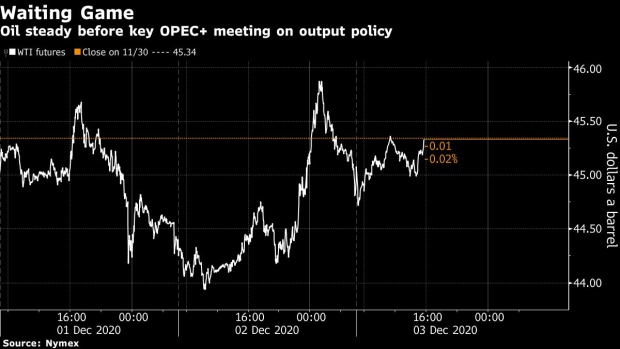Dec 3, 2020
Oil Steady Before Pivotal OPEC+ Meeting on Production Policy
, Bloomberg News

(Bloomberg) -- Oil was steady before an OPEC+ meeting as key powerbrokers in the alliance haggle over output policy after failed talks earlier in the week.
Futures traded near $45 a barrel in New York after rising 1.6% on Wednesday. Discussions are now focusing on proposals for a gradual easing of production cuts over several months, said a delegate, following talks between Russia, Saudi Arabia and the United Arab Emirates. It’s unclear whether the tapering would start in January, or would be delayed to later in the first quarter.
A gentler tapering would offer something to members that are concerned about the fragility of the market, and also to nations that are impatient to increase output. Talks had initially centered on keeping cuts a further three months, but that option ran into obstacles amid a clash between Saudi Arabia and the UAE.
Oil rose to an eight-month high last week on optimism over Covid-19 vaccine breakthroughs, but the rally has stalled amid uncertainty around the OPEC+ negotiations. Libya is also likely to be a headache for the alliance when it resumes talks on Thursday, with the nation pumping at the highest level in a year as its internal conflict abates.
“Plans to start tapering at the start of the year may trigger a bit of a sell-off as worries over the market tipping into oversupply are currently mostly focused on the winter months,” said Vandana Hari, founder of Vanda Insights in Singapore. Prices had built in some premium on expectations that OPEC+ wouldn’t start adding more barrels to the market next month, she added.
Oil spreads at both ends of the curve have strengthened, meanwhile, with the Brent contract for December starting to trade at a premium to the one for December 2022. The bullish structure known as backwardation is signaling expectations for the supply and demand balance to improve next year.
See also: OPEC Core’s Oil Exports Drop Before Face-Off Over Output Targets
If the current OPEC+ agreement isn’t modified, the group will start returning an additional 1.9 million barrels a day of crude to the market from Jan. 1. The delegate, who asked not to be named because the information was private, did not specify whether the proposals being discussed would return that same volume of production over a longer period, or a different amount.
OPEC+ will probably extend output curbs for one to two months and continue to assess quotas on a monthly basis, according to Citigroup Inc. Global oil demand, however, remains “too fragile” between now and when a vaccine will likely be widely available for the market to absorb a planned production increase, JPMorgan Chase & Co. said in a note.
©2020 Bloomberg L.P.


